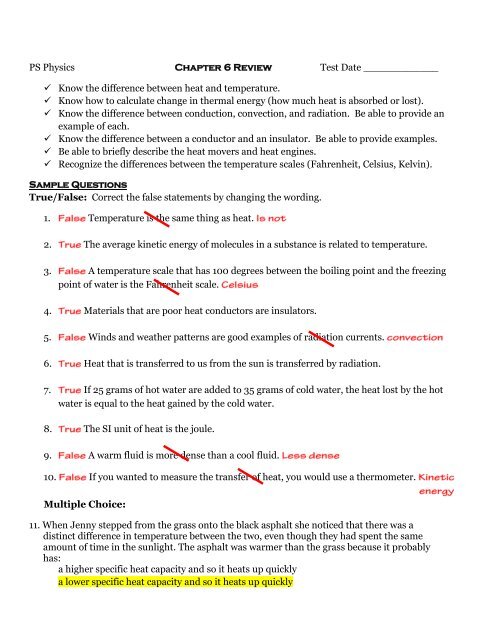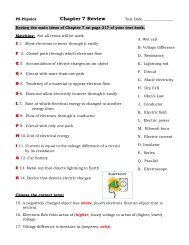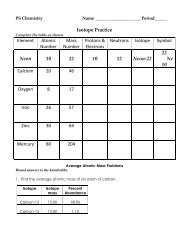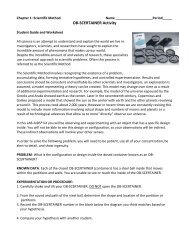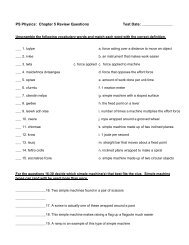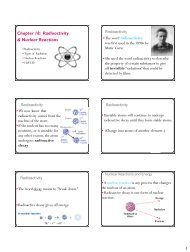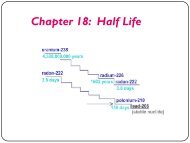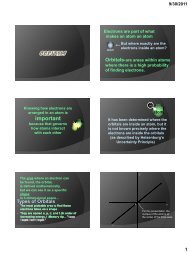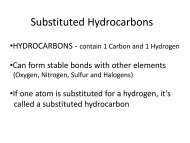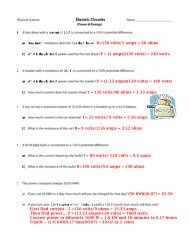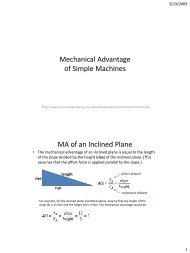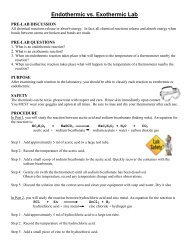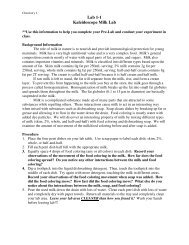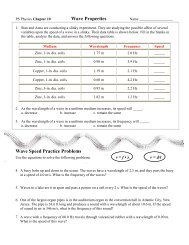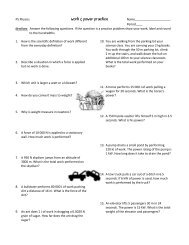ch 6 reviewKEY.pdf
ch 6 reviewKEY.pdf
ch 6 reviewKEY.pdf
Create successful ePaper yourself
Turn your PDF publications into a flip-book with our unique Google optimized e-Paper software.
PS Physics Chapter 6 Review Test Date ____________<br />
Know the difference between heat and temperature.<br />
Know how to calculate <strong>ch</strong>ange in thermal energy (how mu<strong>ch</strong> heat is absorbed or lost).<br />
Know the difference between conduction, convection, and radiation. Be able to provide an<br />
example of ea<strong>ch</strong>.<br />
Know the difference between a conductor and an insulator. Be able to provide examples.<br />
Be able to briefly describe the heat movers and heat engines.<br />
Recognize the differences between the temperature scales (Fahrenheit, Celsius, Kelvin).<br />
Sample Questions<br />
True/False: Correct the false statements by <strong>ch</strong>anging the wording.<br />
1. Temperature is the same thing as heat.<br />
2. The average kinetic energy of molecules in a substance is related to temperature.<br />
3. A temperature scale that has 100 degrees between the boiling point and the freezing<br />
point of water is the Fahrenheit scale.<br />
4. Materials that are poor heat conductors are insulators.<br />
5. Winds and weather patterns are good examples of radiation currents.<br />
6. Heat that is transferred to us from the sun is transferred by radiation.<br />
7. If 25 grams of hot water are added to 35 grams of cold water, the heat lost by the hot<br />
water is equal to the heat gained by the cold water.<br />
8. The SI unit of heat is the joule.<br />
9. A warm fluid is more dense than a cool fluid.<br />
10. If you wanted to measure the transfer of heat, you would use a thermometer.<br />
Multiple Choice:<br />
11. When Jenny stepped from the grass onto the black asphalt she noticed that there was a<br />
distinct difference in temperature between the two, even though they had spent the same<br />
amount of time in the sunlight. The asphalt was warmer than the grass because it probably<br />
has:<br />
a higher specific heat capacity and so it heats up quickly<br />
a lower specific heat capacity and so it heats up quickly
a higher specific heat capacity and so it heats up slowly<br />
a lower specific heat capacity and so it heats up slowly<br />
12. Jenny found that the bricks felt warmer than the grass, even though they had spent the same<br />
amount of time in the sun. This probably means that the bricks will cool down:<br />
more slowly than the grass because the bricks have a higher specific heat capacity<br />
more quickly than the grass because the bricks have a higher specific heat capacity<br />
more quickly than the grass because the bricks have a lower specific heat capacity<br />
13. Whi<strong>ch</strong> of the following statements correctly summarizes the relationship between the <strong>ch</strong>ange<br />
in temperature of a substance and its specific heat capacity, assuming a constant energy<br />
<strong>ch</strong>ange?<br />
The higher the specific heat capacity the slower the <strong>ch</strong>ange in temperature.<br />
The lower the specific heat capacity the faster the <strong>ch</strong>ange in temperature.<br />
The lower the specific heat capacity the slower the <strong>ch</strong>ange in temperature.<br />
The higher the specific heat capacity the faster the <strong>ch</strong>ange in temperature.<br />
14. What temperature is the boiling point of water on the Celsius scale.<br />
212°C 0°C 32°C 100°C<br />
15. What is heat?<br />
a measure of how mu<strong>ch</strong> thermal energy is in an object<br />
the energy transferred from something of higher temperature to lower temperature<br />
the amount of energy required to <strong>ch</strong>ange the physical state of a material<br />
All of the above<br />
16. When a solid is heated, its<br />
Volume increases.<br />
Melting point increases<br />
Volume decreases<br />
Melting point decreases<br />
17. A refrigerator works most like<br />
A heat working when the temperature outside is warm.<br />
A heat pump working when the temperature outside is cold.<br />
Active solar heating<br />
Passive solar heating<br />
18. At absolute zero, the molecules of a substance<br />
Stop moving<br />
Break down into individual atoms<br />
Condense<br />
Boil<br />
19. An example of heat transfer by radiation is<br />
An oven door that feels hot to the tou<strong>ch</strong><br />
Hot air coming out of a hair dryer
The heat from a sun lamp<br />
Boiling water on a glass stove.<br />
20. Forced-air heating systems heat a room by<br />
Convection<br />
conduction<br />
radiation<br />
solar heating<br />
Practice Problems<br />
21. How mu<strong>ch</strong> heat is absorbed when 500 g of water, C= 4.184 J/g o C, goes from 25.0 o C to 35.0 o C?<br />
22. How mu<strong>ch</strong> heat is absorbed when 500 g of copper, C= 0.385 J/g o C , goes from 25.0 o C to 35.0 o C?<br />
23. How mu<strong>ch</strong> heat is released when 150 g of iron cools from 525 o C to 100 o C? (Cp = 0.44 J/g o C)<br />
the temperature of the glass rise?<br />
25. A 50.0 g block of glass (C= 0.50 J/g o C) absorbs 333 joules of heat energy. How mu<strong>ch</strong> does the<br />
temperature of the glass rise?<br />
<br />
<br />
<br />
26. The temperature of a silvers coin (C= 0.24 J/g o C) falls by 353 o C as it releases 5,550 Joules of<br />
heat. What is the mass of the coin?<br />
27. An aluminum can with a mass of 12.5 grams (C= .90 J/g o C) absorbs 245 Joules of heat. How<br />
mu<strong>ch</strong> does the temperature rise?<br />
<br />
<br />
<br />
28. Is mercury (C= 0.14 J/g o C) or silver (C= 0.24 J/g o C) a better conductor of heat? Explain.
29. If a substance freezes at -100°C, what is its freezing poin t on the Kelvin scale? On the Fahrenheit<br />
scale?<br />
30. The weatherman this morning said the expected high today is 1o°F. What is the corresponding<br />
temperature on the other two scales?<br />
Short Answer Essay<br />
31. Distinguish among thermal energy, temperature, and heat.<br />
32. What is absolute zero? What is the corresponding value of absolute zero on the Celsius scale? On<br />
the Fahrenheit scale?<br />
33. What is thermal equilibrium? Provide an example.<br />
34. Is outer space a good conductor or a good insulator for thermal energy? Explain<br />
35. On a hot day, whi<strong>ch</strong> would stay cool longer, a sheet of aluminum (specific heat 920 J/kg K) or<br />
copper (specific heat 380 J/kg K)? Why? CHANGE MATERIAL<br />
Study! Study! Study!


